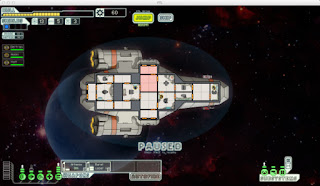FTL: Faster Than Light
is a space simulator where you and your crew are piloting a ship trying to run
from a Rebel fleet bent on stopping you from delivering key data to the
Federation. FTL was developed by
Subset Games (Matthew Davis and Justin Ma) and partially funded through a Kickstarter campaign. The game is
available (Mac, PC, Linux) via the FTL
website or through Steam.
I first heard about FTL
from listing to the Major Nelson podcast where E mentioned that he was playing
the game. From there I searched for the game and found the FTL website. There wasn’t much detail there, so I happened to come
across this YouTube video of a play-through that gave a really good overview of
the game:
FTL has
minimalistic top-down graphics and real-time combat. You control all aspects of
your ship from how much power you put into various ship systems to where you
station your crew (they add bonuses as they become more proficient at a job –
faster weapon power up, etc.) and how you upgrade your ship. The items you most have to manage are fuel, missiles, drone parts and scrap - the currency of the future. The controls are point
and click and easy to learn and you can pause when necessary – which it is if
your ship has been boarded, has a hull breach and is on fire – to help you
think about where to move crew or what part of an enemy ship to target.
The basic elements of the game have you jumping (using FTL
drives) to various spots in a given star sector. At each stop you may run into
hostile ships, potential quests, black market stores or other challenges or
dangers. At each you will have a series of choices to make that may help or
hurt your overall goal to escape the Rebel fleet and reach the Federation. With
each jump you make in a sector, it will (hopefully) take you closer to the exit
point (where you can jump to the next sector) and away from the Rebel fleet
(shown on the jump screen as a growing danger area you want to avoid – read you
fight enemy ships every jump).
FTL doesn’t waste
much energy on the graphics, but the sound is great and the game play is really
engaging. It is similar to rogue-like games (Rogue, NetHack, etc.) in
that death of your ship and crew is permanent. I found that it made me think
fondly of NetTrek and similar minimal
graphics starship games of the past. There are also Stats and Achievements to
help you track how well you have done on each game. There are also multiple
ship designs that can be unlocked by various achievements. I have played six
games so far and unlocked one new ship design and haven’t come close to winning
the game on normal, succumbing to a different death each time.
FTL is hard, fun
and re-playable and at $10, you should go out and get it. If you wonder if FTL is right for you, watch the video
above for a little while to get a feel for how it works and how quickly things
can go from great to running at the edge of your seat. FTL gets 4 Mick Happies. Safe travels in the darkness of space.






No comments:
Post a Comment